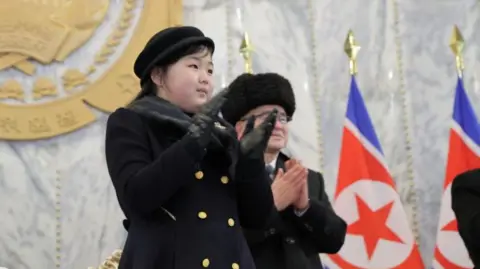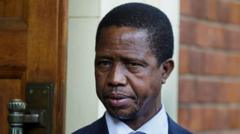As the world comes to terms with the passing of Pope Francis at the age of 88, memorials and tributes have emerged, celebrating his life and legacy while initiating discussions on the future of the Catholic Church. The Vatican has scheduled a simplified funeral for the late pontiff on Saturday, breaking with traditional elaborate rites that he himself sought to reform during his papacy.
In a departure from the ostentatious norms of papal funerals, Pope Francis expressed his desire to be interred in an undecorated tomb, preferring simplicity in both life and death. His modest approach extended to the arrangements surrounding his death, as cardinals from around the world converge on the Vatican for the task of selecting a new leader for the 1.3 billion Catholics they represent.
At a memorial service in Caracas, mourners expressed their grief over the loss of a pope who resonated deeply within Latin America and beyond. The service drew attendees from multiple communities who appreciated Francis for his compassion towards the poor and marginalized. Each prayer and reflection praised his commitment to a church of inclusivity and mercy.
Worldwide, nations are observing periods of mourning, with flags at half-staff in countries ranging from Argentina to the United States. Leaders and dignitaries are expected to converge on Vatican City for Saturday’s service, rekindling discussions over the papacy's direction, especially concerning issues such as migration, social justice, and climate change that Francis fervently addressed during his tenure.
Political dynamics have shifted since the election of Francis in 2013. As conservatives look to recalibrate their influence post-Francis, there is speculation about what the next pope’s direction might entail—whether it will be a return to a more traditional style, or a continuation of the progressive pathways Francis pursued.
As discussions intensify around the potential successors, ranging from Cardinal Pietro Parolin, known for his diplomatic acumen, to Luis Antonio Tagle, who embodies a more forward-thinking approach, observers are keen to see how these figures could shape the Catholic Church’s engagement with contemporary global challenges.
With Francis's legacy etched in the hearts of many, the challenge remains for the Church to embrace his progressive ideals while addressing the stark realities ahead. His absence opens a pivotal chapter in the Vatican, underscoring a need for leadership that resonates with the values of love, unity, and compassion that he championed throughout his life.
In a departure from the ostentatious norms of papal funerals, Pope Francis expressed his desire to be interred in an undecorated tomb, preferring simplicity in both life and death. His modest approach extended to the arrangements surrounding his death, as cardinals from around the world converge on the Vatican for the task of selecting a new leader for the 1.3 billion Catholics they represent.
At a memorial service in Caracas, mourners expressed their grief over the loss of a pope who resonated deeply within Latin America and beyond. The service drew attendees from multiple communities who appreciated Francis for his compassion towards the poor and marginalized. Each prayer and reflection praised his commitment to a church of inclusivity and mercy.
Worldwide, nations are observing periods of mourning, with flags at half-staff in countries ranging from Argentina to the United States. Leaders and dignitaries are expected to converge on Vatican City for Saturday’s service, rekindling discussions over the papacy's direction, especially concerning issues such as migration, social justice, and climate change that Francis fervently addressed during his tenure.
Political dynamics have shifted since the election of Francis in 2013. As conservatives look to recalibrate their influence post-Francis, there is speculation about what the next pope’s direction might entail—whether it will be a return to a more traditional style, or a continuation of the progressive pathways Francis pursued.
As discussions intensify around the potential successors, ranging from Cardinal Pietro Parolin, known for his diplomatic acumen, to Luis Antonio Tagle, who embodies a more forward-thinking approach, observers are keen to see how these figures could shape the Catholic Church’s engagement with contemporary global challenges.
With Francis's legacy etched in the hearts of many, the challenge remains for the Church to embrace his progressive ideals while addressing the stark realities ahead. His absence opens a pivotal chapter in the Vatican, underscoring a need for leadership that resonates with the values of love, unity, and compassion that he championed throughout his life.



















